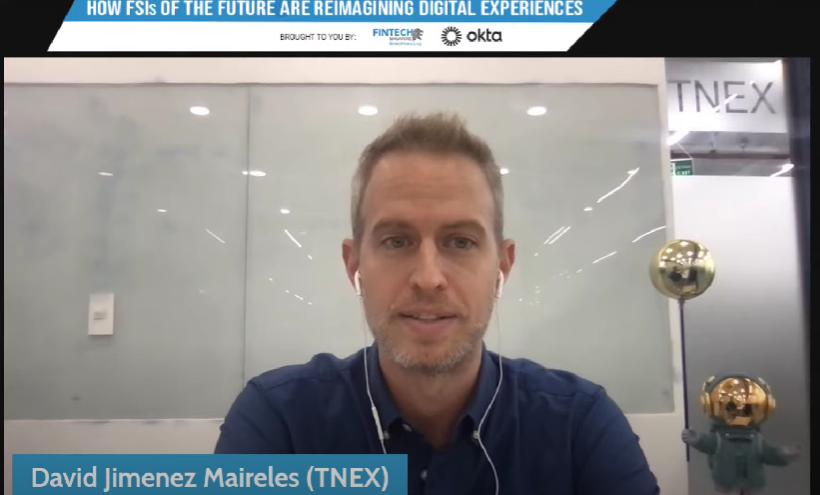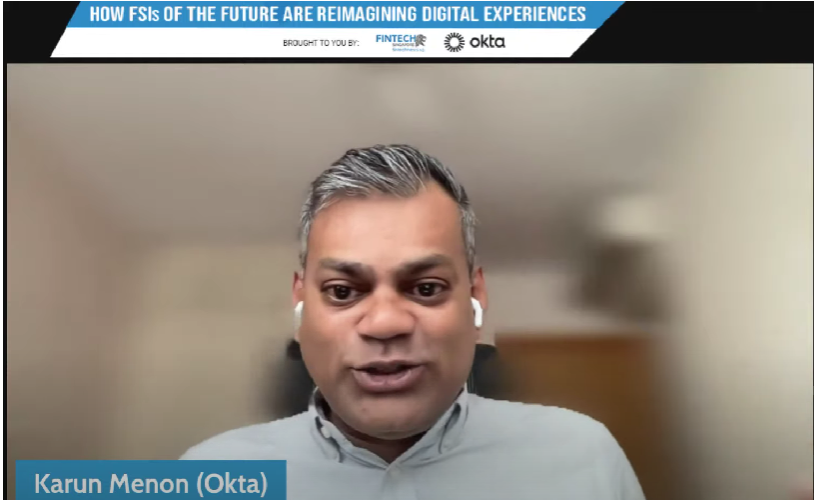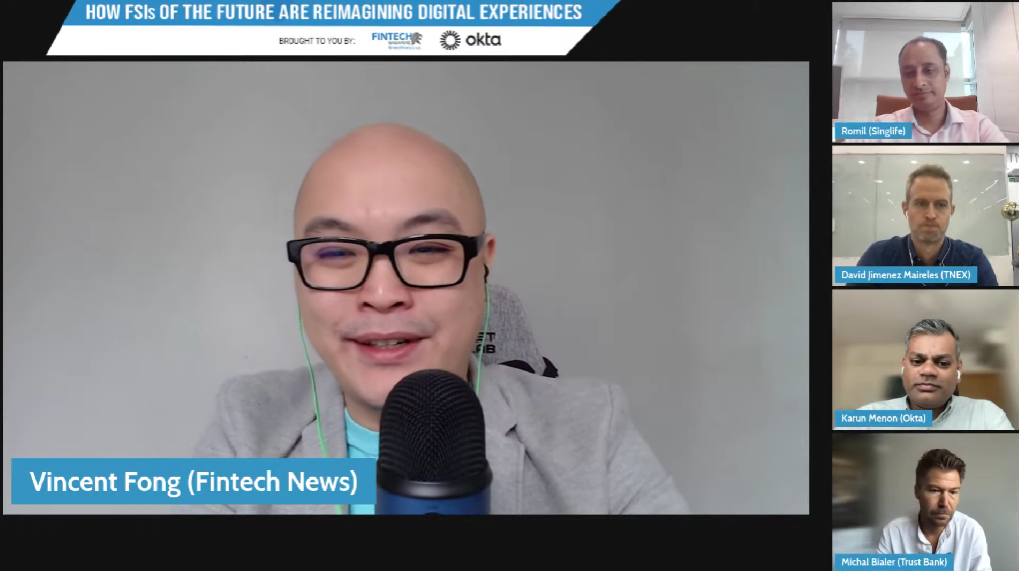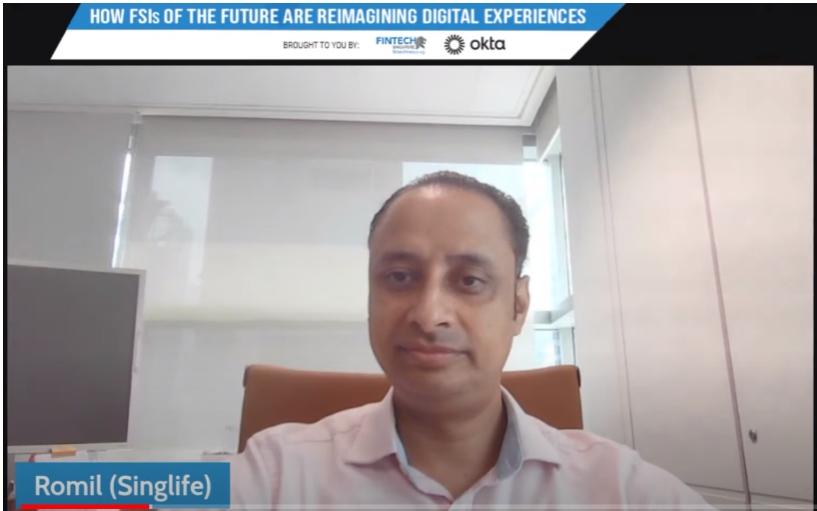
Breaking the Mold: How Next-Gen FSIs are Redefining Digital Experiences
by Rebecca Oi April 13, 2023As the world increasingly relies on digital technology, financial service institutions (FSIs) are constantly adapting to meet the changing needs of their customers.
FSIs must reimagine their digital experiences to stay competitive and provide a more seamless and efficient customer journey. This requires a fundamental shift in how they approach customer service and investments in technology that can support these new approaches.
In a recent Fintech Fireside Asia webinar titled “How the FSIs of the Future Are Reimagining Digital Experiences,” moderated by Fintech News Chief Editor Vincent Fong; practitioners from leading digital-first organisations shared their observations and insights on the trends and factors shaping user expectations in digital experiences for FSIs.
The panel comprises Karunanand Menon, Regional Principal Solutions Engineer at Okta; Romil Sharma, Group Head of Technology and Operations; David Jimenez Maireles, Chief Experience Officer and Deputy CEO of TNEX and Michal Bialer, Chief Product Officer at Trust Bank.
Digital Banking Challenges and Evolving Customer Expectations
David Jimenez Maireles, Chief Experience Officer and Deputy CEO of TNEX, discussed the challenges facing FSIs in meeting the ever-changing expectations of their customers. With the advent of new technologies such as APIs, open banking, and composable banking, customers are demanding a unique and seamless experience across all services.
TNEX, one of Vietnam’s first digital-only banks for retail consumers and micro-merchants, has been at the forefront of these changes. Since its launch in 2020, the bank has recorded put more than 1.5 million mobile banking customer sign-ups.
Customer expectations constantly evolve, and the financial services industry must adapt to meet these demands. In Vietnam, the landscape is particularly interesting, with several leading e-wallets, such as Momo and Zalo Pay, reshaping customer expectations.
As a result, many banks are trying to adopt a super app approach to provide a unique experience to their customers. The challenge for banks in Vietnam, including trailblazers like TNEX, is to react swiftly and effectively to customer expectations that are evolving rapidly.
Customer-Centric Approaches
Karunanand Menon, Regional Principal Solutions Engineer at Okta, supported David’s views on the fast-changing customer expectations and emphasized that FSI organisations must adjust to these changes.
Banks have responded by adopting super app strategies to diversify into adjacent markets and provide customers with a one-stop shop for various services. Another trend is the cross-pollination of loyalty programmes and financial institutions, with banks partnering with third-party loyalty providers to deliver a more customised experience to their customers.
Michal Bialer, Chief Product Officer at Trust Bank, shared his experience launching Trust Bank, emphasizing the importance of extensive beta testing with real customers. This approach helps FSIs identify and address potential issues before launching their products, ensuring end-users a better and smoother experience.
Beta testing is critical to gathering real-life examples of customer use cases, often different from testing scenarios in a safe environment. Michal emphasized that digital organisations must prioritise quick access to customer feedback across all channels to improve their products continually.
Michal highlighted the importance of a holistic approach to the customer onboarding experience. This involves considering everything from awareness to the post-account opening process.
The importance of the first 30 to 90 days after onboarding in establishing an emotional connection with customers was emphasized by Michal. Since the credit or debit card is the only physical touchpoint for users, creating a seamless and enjoyable activation experience is crucial. Over time, this emotional connection can be fostered and strengthened.
Michal reminded tech companies looking to offer financial services to be aware of regulatory requirements and licensing restrictions. This will help them avoid regulatory obstacles when integrating financial services into their offerings.
The Super App Debate
When asked whether banks should aspire to become super apps, Romil Sharma, Group Head of Technology and Operations at Singlife explained that banks in Singapore and other industries, such as insurance, have adopted the concept. The idea is to provide customers with a consolidated, omnichannel experience across multiple touchpoints.
Romil mentioned that their company, Singlife, is working on a roadmap to bring claims, policies, and other services together in one place for a more seamless customer experience.
Michal acknowledged multiple directions for banks and fintech companies to take regarding the super app concept. He believed the focus should be on solving customer problems, with companies taking one step at a time to address customer needs. The popularity of apps such as WhatsApp, which offers simplicity and widespread connectivity, can be a guide for fintech companies looking to expand their services.
How the Emergence of ChatGPT Helped Reimagined the Use of AI in Improving Customer Experiences
Romil as the Group Head of Technology and Operations at Singlife, identified two significant trends that have reshaped user expectations in the FSI sector. Firstly, the increasing usage of Artificial Intelligence (AI) and machine learning by financial institutions such as Singlife and banks has allowed them to provide better and more personalised customer experiences. Secondly, there is a growing need for single sign-on across different applications.
David acknowledged that AI has enormous potential in banking and claimed that the industry had only scratched the surface. He noted that while social media and big tech companies had already begun using AI for growth, banks still had much to learn about implementing these technologies.
He likened the rise of AI in banking to the launch of the iPhone in 2007, and suggested that those who fail to embrace AI’s possibilities would miss the next big revolution. With tools like ChatGPT, banks could see AI’s benefits, such as personalised customer recommendations based on vast data.
David highlighted that AI could be used at various stages of the banking process, such as onboarding flows, risk profiling, and customer experience. He also mentioned using AI for OCR solutions, eKYC approval rates, and treasury departments.
AI in the Financial Sector: Exploring New Possibilities
Recent incidents, such as Samsung’s recent fine, reminded the industry that all new technologies have problems. However, the sector is increasingly adopting AI and machine learning, as they offer many benefits for financial operations.
Financial institutions used AI to automate tasks such as creating forms and letters, and some companies are testing ChatGPT’s abilities to generate content for customer interactions. The challenge is deciding whether to develop or buy AI solutions while considering privacy issues.
According to Romil, insurance companies have enhanced their customer service and claim processing by utilising AI. For example, life insurance companies have been exploring ways to automate and optimise their claims processing to simplify the process for customers and ensure they receive coverage.
By leveraging AI algorithms, insurance companies can identify additional claims based on each customer’s specific circumstances, allowing them to offer more personalised and streamlined claims experiences.
As AI evolves at an unprecedented rate, companies must keep up with the latest developments and anticipate future trends. The financial sector is poised to transform significantly as AI technologies become more integrated, ultimately enhancing user experiences and streamlining operations.
Financial institutions that embrace AI and machine learning will be better positioned to adapt to these changes and provide more customer-centric solutions.
As the panelists from various financial companies suggest, collaboration and learning from one another will be vital in navigating this rapidly changing landscape. The future of AI in finance is undoubtedly exciting as its potential to revolutionise the industry becomes more apparent.












